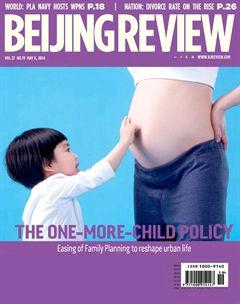EMERGENCY APPOINTMENT
China Resources (Holdings) Company, one of Chinas largest stateowned conglomerates, named Fu yuning as its new chairman, replacing Song Lin, who is under investigation and was dismissed from his post. The company made the decision during a meeting in Hong Kong on April 23.
Born in 1957, Fu obtained his Ph.D. in Offshore Engineering from Brunel University in Britain. He was the former chairman of the state-owned China Merchants Group Ltd. and a chairman of China Merchants Bank. China Resources owns a group of companies ranging from real estate to gas.
Mobile Internet Challenges BAT
Caijing Magazine April 21
Chinas Internet business has enjoyed rapid growth over the past two decades. The growth of e-business has long been driven by advertising, but now this commercial pattern will be altered greatly by mobile Internet technology.
Since last year, the oligarchy of Baidu, Alibaba and Tencent (BAT) in the Internet sector has been challenged by the rise of the mobile Internet, which is expected to provide the online gateway to the offline market worth tens of trillions of yuan and transform the landscape of domestic Internet industry.
The technical barrier of the Internet is disappearing. More and more corporations based in traditional businesses have taken part in the emerging Internet market competition. With the help of mobile Internet technology, corporations are able to create new business and consumption demands.
The BAT, in an effort to maintain and expand their monopoly positions, has made separate acquisitions in nearly every segment in the last couple of years. Segment leaders like Xiaomi (a smartphone producer) and Meituan (an e-business developer) will probably become industry heavyweights, and todays small players may even become the true disruptors of the industry in the future.
A Step Forward on Land Reform
Caixin Magazine April 21
The southern city of Shenzhen is always at the forefront of Chinas reform policy. Recently, the special city forged a groundbreaking trail to grant legal status to some residential buildings and allowed them to be sold on the market.
The residential buildings, constructed on collectively owned land, mostly in rural areas, had been banned from being sold. They are only used as residential houses for the land owners, or local rural residents. Any trade of these residential buildings with limited property rights is deemed illegal. In the last decade, amid fast-expanding urbanization, a large number of natural villages have become parts of urban areas. But these residential houses on collectively owned land have never been permitted to be traded or mortgaged on the market as free as other commercial real estates.
Although the Central Government decided to reform the current policy on collectively owned land in 2013, the ban on buildings constructed on collectively owned land has not yet been overturned. Even Beijing has taken strict measures to forbid and dismantle illegal buildings in the megacity since last year.
However, illegal buildings on collectively owned land are necessary to meet the strong demands of accommodating rural migrant workers who flock into cities to make a living. In Shenzhen, for example, around 31.62 percent of newly migrated people are living in illegal buildings with limited property rights.
Shenzhens pilot might end the governments strict control on land resources and alter the economic growth relying heavily on land development.
Controversial vehicles Inspection
Peoples Daily April 23
The mandatory annual inspection of vehicles aims to check automobiles and find potential safety hazards in order to help reduce road traffic accidents. Is it really necessary for all drivers and passengers? The public have expressed doubts and called on the government to cancel the annual safety inspection.
Automobile owners complain that inspection procedures are too complicated. While cars have increased rapidly in recent years, the number of vehicle safety inspection stations is not able to meet the strong demands. As a result, long wait times have become a burden. Moreover, vehicle inspecting stations are often accused of providing poor services and collecting unauthorized fees. Furthermore, the safety inspection cannot ensure strict inspection over vehicles. Some car owners even bribe the staff of inspection stations to acquire qualified certification.
If the government eases control on vehicle inspection monopoly and allow automobile service providers to offer inspection services, the current problems could be resolved. In fact, many authorized automobile maintenance-service providers are capable of inspecting the safety of cars. It will be more affordable for consumers to receive inspection of their special service providers. As the quality of cars improves, some experts even argue that vehicle inspections should be done every three or five years.
STAR MAKES COMEBACK
Chinas national swimming team lifted the ban on competing and endorsement on Olympic champion Sun yang on April 24, who was suspended from the national team for months after a feud with his coach and being caught driving without a license.

